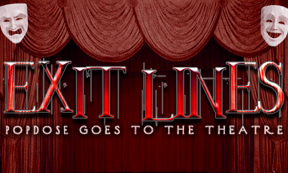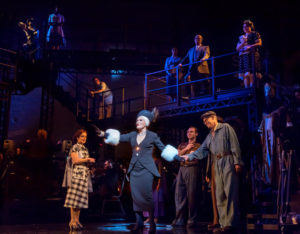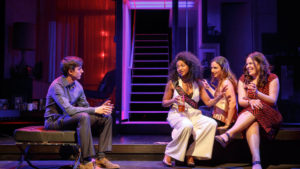 Andrew Lloyd Webber couldn’t get arrested on Broadway after Sunset Boulevard closed in 1997, as the era of glitzy British imports that floated the main stem in the 80s wound down. Twenty years later, it’s LloydWebberWorld again, as a revival of his last (and more modest) hit joins Phantom, Cats, and School of Rock as if Chicago, The Lion King, and Hamilton had never happened, besting his record of three shows running simultaneously on Broadway in his heyday. Coming back–err, “returning” with him–is his Tony-winning star, Glenn Close, in her Tony-nominated original costumes.
Andrew Lloyd Webber couldn’t get arrested on Broadway after Sunset Boulevard closed in 1997, as the era of glitzy British imports that floated the main stem in the 80s wound down. Twenty years later, it’s LloydWebberWorld again, as a revival of his last (and more modest) hit joins Phantom, Cats, and School of Rock as if Chicago, The Lion King, and Hamilton had never happened, besting his record of three shows running simultaneously on Broadway in his heyday. Coming back–err, “returning” with him–is his Tony-winning star, Glenn Close, in her Tony-nominated original costumes.
Close was 50 when the show, which opened in 1994, ended its run. Which is to say, the same age as her character, silent film star Norma Desmond. Fifty seemed old to me when I saw the show, at age 29, and suffice it to say I know better now. Carrying what was then a super-production was no easy task. Close just turned 70, and remains fabulous in her great tour de force, vibrant with pathos, psychosis, longing, and grandeur that beats back the years. The difference is that, with the set and staging stripped down to its essentials, she is the show. Yes, there’s still an antique car that rattles across the stage in one key scene, but Close is driving.
 A good thing, too, as Sunset Boulevard, the musical, sputters and stops when Norma isn’t centerstage. Almost 70 years after its release Billy Wilder’s remorseless noir still crackles, for reasons not limited to its great script, sensational performances by Gloria Swanson, William Holden, and Erich von Stroheim, and black and white cinematography. It has a fine score, too, by the great Franz Waxman. The musical has definite pluses. Webber’s overture (more in the vein of Miklos Rozsa’s memorable music for Wilder’s Double Indemnity and The Lost Weekend) is lush and inviting, and there are two outstanding songs for the lost Norma, one per act, “With One Look” and “As If We Never Said Goodbye.” Max, her pathologically devoted butler, gets one, too, “The Greatest Star of All,” a rumination on former glories. (I was sitting just seats away from Hillary Clinton when I saw the show, and thought, “Does she see herself in these lyrics?”)
A good thing, too, as Sunset Boulevard, the musical, sputters and stops when Norma isn’t centerstage. Almost 70 years after its release Billy Wilder’s remorseless noir still crackles, for reasons not limited to its great script, sensational performances by Gloria Swanson, William Holden, and Erich von Stroheim, and black and white cinematography. It has a fine score, too, by the great Franz Waxman. The musical has definite pluses. Webber’s overture (more in the vein of Miklos Rozsa’s memorable music for Wilder’s Double Indemnity and The Lost Weekend) is lush and inviting, and there are two outstanding songs for the lost Norma, one per act, “With One Look” and “As If We Never Said Goodbye.” Max, her pathologically devoted butler, gets one, too, “The Greatest Star of All,” a rumination on former glories. (I was sitting just seats away from Hillary Clinton when I saw the show, and thought, “Does she see herself in these lyrics?”)
But three songs do not a legendary musical make. Yes, Sunset Boulevard won Tonys for best musical, score, and book–which would be far more impressive if it had any competition at the 1995 ceremony. (Smokey Joe’s Cafe, a revue, was the only other musical nominated that year, and there were no other nominees for score and book, making those default wins in a period for Broadway musicals that was as lonely as Norma’s house.) Wilder told potential adapter Stephen Sondheim that the film, with its grande dame, could only work as an opera, which deterred him; Webber, undaunted, pressed on, with the estimable Don Black (of Lloyd Webber’s Aspects of Love and numerous hit songs) and Christopher Hampton (Les Liaisons Dangereuses) providing book and lyrics.
Out from the original, pitch-black vision went the “mummies” scene, where Norma is surrounded by other remnants of the silent film era. Not a problem, that’s what adaptation’s about. Too much of the show, however, is about lightening the load, and making the luckless writer enmeshed in Norma’s twilight world, Joe Gillis (Michael Xavier), more sympathetic. The part of his girlfriend, Betty (Siobhan Dillon), has been beefed up, mostly to get the show out of that gloomy mansion and go on a song and dance spree every so often. The darkness should envelop Joe, as it does in the movie, where William Holden’s customary cynicism is no defense. With the character rendered colorless, the poisoned essence is dispelled (as it was in a subsequent noir musical, Sweet Smell of Success). Getting rid of the bric-a-brac was a good idea on the part of director Lonny Price; Close’s star shines all the brighter now in a more barebones staging. But it’s a hollow triumph.
 Perhaps some of the old Sunset Boulevard set was sent Off Broadway, for the one-man show The Object Lesson, where the one man (“absurdist performance artist” Geoff Sobelle) was so surrounded by clutter you could barely see his routines. (Being more “funny” than actually funny, I eventually gave up looking.) Most of it, I think, was carted off to the American Airlines Theatre, where the Roundabout has revived Arthur Miller’s The Price. First produced in 1968, it’s often referred to as Miller’s last “real” play, before the author of Death of a Salesman and The Crucible went more experimental and uncommercial. In recent seasons, the thing has been to abstract his more realist works, like All My Sons and A View from the Bridge, in emotionally remote stagings that left me cold. The good news about The Price is that Steppenwolf veteran Terry Kinney has let the play stand on its own merits; the not-so-good is that the fundamentals aren’t as strong as they are in Miller’s classic work.
Perhaps some of the old Sunset Boulevard set was sent Off Broadway, for the one-man show The Object Lesson, where the one man (“absurdist performance artist” Geoff Sobelle) was so surrounded by clutter you could barely see his routines. (Being more “funny” than actually funny, I eventually gave up looking.) Most of it, I think, was carted off to the American Airlines Theatre, where the Roundabout has revived Arthur Miller’s The Price. First produced in 1968, it’s often referred to as Miller’s last “real” play, before the author of Death of a Salesman and The Crucible went more experimental and uncommercial. In recent seasons, the thing has been to abstract his more realist works, like All My Sons and A View from the Bridge, in emotionally remote stagings that left me cold. The good news about The Price is that Steppenwolf veteran Terry Kinney has let the play stand on its own merits; the not-so-good is that the fundamentals aren’t as strong as they are in Miller’s classic work.
It begins tautly. Victor Franz (Mark Ruffalo), a New York cop mulling retirement at age 50, is planning to sell off his parents’ possessions, which have been socked away since the Great Depression and surround the performers. His practical wife, Esther (Jessica Hecht), urges him to get the best price from the wily antique dealer, Gregory Solomon (Danny DeVito), he’s engaged for the deal. Victor and Gregory wrangle, often humorously, as the histories of some of the belongings are unpacked, exposing the scar tissue left by family rancor and unhappy compromises. They come to an agreement–then Victor’s long-absent older brother Walter (Tony Shalhoub) arrives, with his own agenda. Intermission.
What should lead to rising tension instead dissolves into an onstage psychotherapy session, with the three family members analyzing one another, as Solomon (the name is no coincidence) peeks in. The monologues are of course scrupulously well acted, with Ruffalo again proving his theatre chops for his first Broadway show since the excellent 2006 revival of Clifford Odets’ Awake and Sing! and DeVito thoroughly engaging in his Broadway debut, at age 72. But they’re also overwritten, and what could have been resolved more suspensefully, and movingly, drags to its conclusion. I didn’t feel the same impatience with the show’s 1999 revival, maybe because The Price was new to me then. This is a fine, stage-filling production of a play that feels second-hand, as if Miller was eager to leave this mode behind for something else.
Speaking of Broadway stages awash in clutter, this.
 Off Broadway is now on Broadway, as the Pulitzer Prize-winning Sweat, plus Indecent and Oslo, vie for attention in a season-ending period filled with more obvious crowdpleasers. (I’ve discussed their merits in previous columns; Indecent is the one to see.) Let’s hope they find more takers than Joshua Harmon’s Significant Other, which is closing tomorrow after a short run. Harmon, the author of the comedy Bad Jews, has here written Sad Jew, as hapless Jordan, on the cusp of 30, loses his three best girlfriends to marriage and frets over finding a boyfriend to replace them. Gideon Glick is a pain in the ass as the fearful Jordan, and properly so, though his tirades do wear on you; mitigating our anxiety over his is a sharply staged production highlighted by two other actors, John Behlmann and Luke Smith, who seamlessly play multiple roles and a warm showcase for Barbara Barrie, as Jordan’s grandmother. Clearly, however, Off Broadway, where it ran two summers ago, was a happier home for this small-scale dramedy.
Off Broadway is now on Broadway, as the Pulitzer Prize-winning Sweat, plus Indecent and Oslo, vie for attention in a season-ending period filled with more obvious crowdpleasers. (I’ve discussed their merits in previous columns; Indecent is the one to see.) Let’s hope they find more takers than Joshua Harmon’s Significant Other, which is closing tomorrow after a short run. Harmon, the author of the comedy Bad Jews, has here written Sad Jew, as hapless Jordan, on the cusp of 30, loses his three best girlfriends to marriage and frets over finding a boyfriend to replace them. Gideon Glick is a pain in the ass as the fearful Jordan, and properly so, though his tirades do wear on you; mitigating our anxiety over his is a sharply staged production highlighted by two other actors, John Behlmann and Luke Smith, who seamlessly play multiple roles and a warm showcase for Barbara Barrie, as Jordan’s grandmother. Clearly, however, Off Broadway, where it ran two summers ago, was a happier home for this small-scale dramedy.
 I hate to end on a sour note, but bigger names have whiffed this season away from Broadway. Despite the best efforts of Matthew Broderick, John Epperson, and other notables, including the playwright himself, Wallace Shawn’s dystopian Evening at the Talk House wasn’t so much a call to arms against authoritarian government as a lukewarm satire of dog-eat-dog show business, not the freshest metaphor. More disappointing is a new Public Theater collaboration between David Byrne and director Alex Timbers, Joan of Arc: Into the Fire, whose punning title suggests something livelier than a monotonous sung-through bio-musical in Williamsburg hipster clothes. Best efforts to keep the staging active via performer “movement” and projections are defeated by a score heavier on exposition than melody–it’s no Here Lies Love, where the audience moved in tandem to the beat. With little, ahem, at stake, a communal drowsiness was all I observed here, as some very talented artists proved that a Joan of Arc musical wasn’t such a hot idea. OK, I’ll stop.
I hate to end on a sour note, but bigger names have whiffed this season away from Broadway. Despite the best efforts of Matthew Broderick, John Epperson, and other notables, including the playwright himself, Wallace Shawn’s dystopian Evening at the Talk House wasn’t so much a call to arms against authoritarian government as a lukewarm satire of dog-eat-dog show business, not the freshest metaphor. More disappointing is a new Public Theater collaboration between David Byrne and director Alex Timbers, Joan of Arc: Into the Fire, whose punning title suggests something livelier than a monotonous sung-through bio-musical in Williamsburg hipster clothes. Best efforts to keep the staging active via performer “movement” and projections are defeated by a score heavier on exposition than melody–it’s no Here Lies Love, where the audience moved in tandem to the beat. With little, ahem, at stake, a communal drowsiness was all I observed here, as some very talented artists proved that a Joan of Arc musical wasn’t such a hot idea. OK, I’ll stop.





Comments